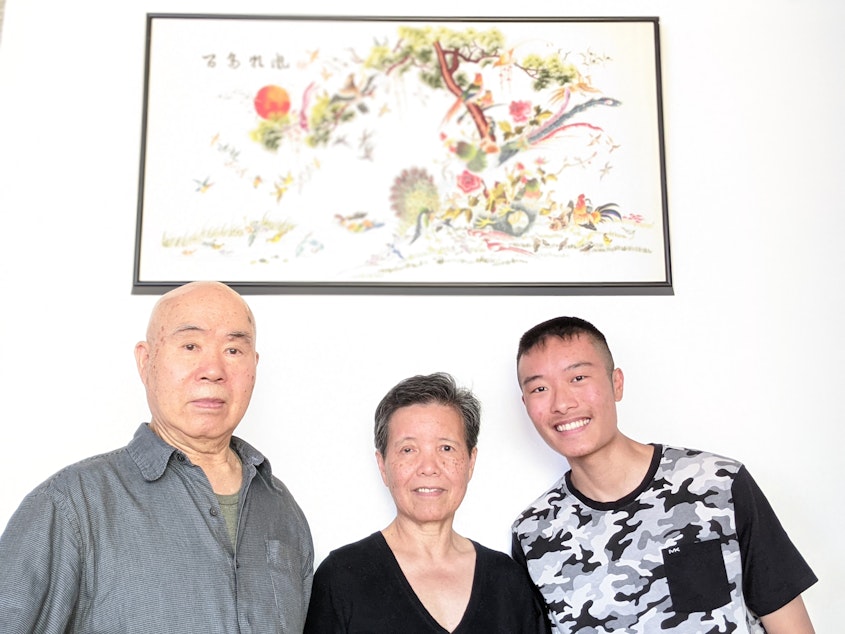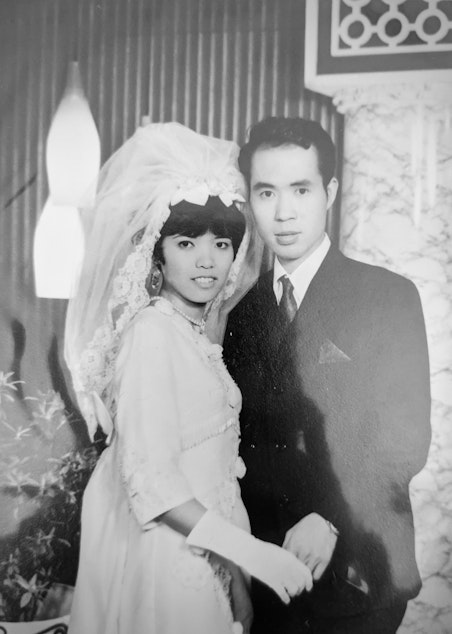Most basements are boring, but my yeye’s basement is a barbershop

Yuk and Cho Yuen have run a barbershop out of the basement of their Beacon Hill home for 40 years. Before they came to Seattle, Yuk and Cho ran another barbershop, in Hong Kong.
Colin Yuen talked to Yuk, his grandma, about her immigration story, her love story, and what he has to learn from her.
[RadioActive Youth Media is KUOW's radio journalism and audio storytelling program for young people. This episode was entirely youth-produced, from the writing to the audio editing.]
M
y ye ye and yin yin met at a barbershop in Hong Kong in 1966. My ye ye was a barber and my yin yin needed a haircut. The rest is history.

They got married, and had a baby daughter. My yin yin says at the time in Hong Kong, education was both expensive and not very good. And she was worried about overpopulation in the city. They decided to move their young family to New York.
If my yin yin was going to go all in on moving to America, she had to let go of the friends and family she had known her whole life in Hong Kong.
"I had lots of friends, and customers, and my ma and my mother-in-law, a lot of people," my yin yin remembers. "So when we come here, we try to make some new friends."
When they moved, my yin yin was surprised to find there were already a lot of Chinese people living in New York. "When I first came here," she tells me, "I already see somebody I know! So that's why I'm so happy."
My grandmother was excited by the number of people that she could talk to in New York. But they simply weren't making enough money to live there. That's when their friend told them about an opportunity to have a barber shop in their own house in Seattle. They jumped at the chance.
Seattle was different. My grandmother didn’t know any people there, and not many people spoke Cantonese, so she says it was hard to communicate.
"American people said we have an accent, you know, a Chinese accent," she says. "They don't understand what I'm saying. That's why it make me so embarrassing."
My grandma took English classes and watched English shows on TV. It started to get easier to communicate, and eventually she was able to make some new friends.
"Right now I have a lot of friends," she tells me. "They have already retired, so we can play mahjong all the time!"
I asked my yin yin if she was happy that she came to America. She says the job opportunities and education that it provided her children made all the challenges worth it.
"My son, he got a very good job," she says, "and then I have two daughter, they both get good jobs too, so that's why I'm so happy we move here."

As I listened to my yin yin talk about her life, I reflected on the Covid-19 pandemic. It made me realize that if they had gotten sick, I could have lost them and these pieces of my family’s history.
I feel so lucky to be able to sit with them and learn about their past. As I grow up, they pass the baton of our family’s legacy to me. I carry their stories as I write my own.
This story was created in KUOW's RadioActive Online Intro to Radio Workshop for 15- to 18-year-olds, with production support from Kenju Waweru and Morgen White. Prepared for the web by Morgen White. Edited by Kelsey Kupferer.
Find RadioActive on Facebook, Twitter, Instagram, TikTok, and on the RadioActive podcast.
Support for KUOW's RadioActive comes from the Bill & Melinda Gates Foundation Discovery Center.
If you have any feedback on this story, you can email RadioActive at radioactive@kuow.org, or click the teal feedback tab on the edge of this page. Reach out. We're listening.



